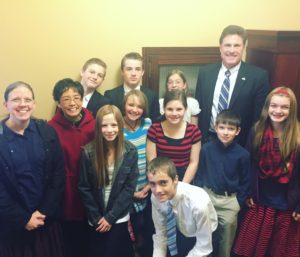The following is an excerpt from my monthly newsletter. To see the full newsletter and/or to be added to the newsletter email list, please send an email to jim@electdunnigan.com.
Special Session Review
The Utah State Legislature had its first interim day May 18, in conjunction with a special session convened by the governor. The purpose of the special session was to deal with restoring funding for some education initiatives and to vote on H.C.R. 201, declaring opposition to the unilateral designation of national monuments in Utah through the Antiquities Act.
The Legislature voted in favor of restoring funding for a number of education programs and initiatives, including:
- $1.5 million ongoing Education Funding, plus an additional $500,000 TANF for UPSTART, an early education initiative targeted toward an individualized reading, mathematics and science curriculum. This restored funding will allow about 2,300 additional children to participate in the program, which has been found to be a unique solution especially for rural and low-income families with limited access to pre-K opportunities. Year after year, third-party evaluations have shown UPSTART children to be two to three times as prepared for Kindergarten as children evaluated within a control group.
- $275,000 one-time Education Funding for ProStart, a school-to-career culinary arts program providing career training and certifications for high school students throughout the state. The ProStart program is in 62 schools and every district, and has been training Utah culinary professionals for 20 years.
- $500,000 ongoing Education Funding for Elementary Reading Assessment Tools, a statewide program that enhances the evaluation of early education programs. This funding is intended to provide every school district and charter school within the state to access these programs.
- $3 million one-time Education Funding for K-3 Early Intervention. With this funding, schools can choose from among five different interactive reading software programs to assist in early reading learning. Without these funds, 22,000 students currently receiving high-quality reading instruction through technology would be unable to continue. Third-party evaluations of these programs have shown significant positive effects in kindergarten and first-grade students.
- $500,000 one-time Education Funding for IT Academy, a program that provides opportunities for high school students to obtain basic to advanced certifications in software and network administration that will help prepare them for college and careers. Utah currently leads the nation in this program, with a 22 percent increase in the pass rate of certification exams.
The Governor’s Office and the Legislature will continue to monitor these programs, including visits to participating schools and discussions with participants, to ensure their effectiveness.
Though there was enough support in the Legislature to override Governor Herbert’s veto of these items, agreeing to a special session in conjunction with the regularly-scheduled interim meetings saved the state approximately $40,000 in taxpayer funds. Speaker of the House Greg Hughes said, “While the House had the support for a veto override session, it was always our top priority to restore the funding for these programs and that was accomplished when we came together for our interim meetings in May.”
The Interim Process
During the 45-day general session, many items that don’t make it through committee are put on a master study list. The committee chairs then prioritize what should be studied over the interim period based on this list and input from committee members.
The Speaker of the House of Representatives, Senate President, Majority Leader Jim Dunnigan, and committee chairs meet to collectively determine the final list. The Legislative Management Committee then votes on and adopts the interim study items and schedule. Due to the limited number of meetings, committees focus on those issues that are top priority to help ensure a proper vetting.
Interim committees, which are comprised of both representatives and senators, meet throughout th
e year. They listen to expert and public testimony regarding the particular issues they are studying and determine whether or not to recommend legislation. The interim committees also vote to prioritize particular bills for the upcoming general session and occasionally for future special sessions, should one occur.
Interim committee meetings are held throughout the year, generally the third Wednesday of the month, are open to the public. They can be streamed live or listened to later at: le.utah.gov. A list of agenda items that are scheduled to be studied during the 2016 interim, and schedule, can be found at: UtahReps.net.



